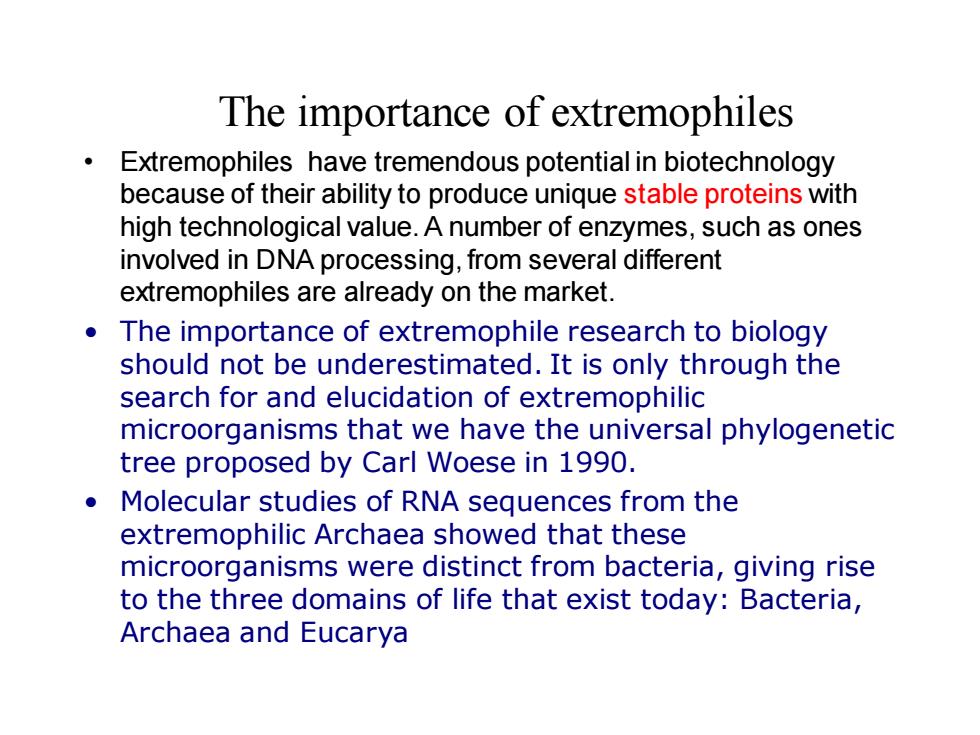
Terms used to describe extremophiles include the following: .Alkaliphile:An organism with optimal growth at pH values above 10. .Barophile:An organism that lives optimally at high hydrostatic pressure. .Endolith:An organism that lives in rocks. .Extreme Acidophile:An organism with a pH optimum for growth at, or below,pH 3. .Extremophile:An organism that is isolated from an extreme environment and often requires the extreme condition for growth.Extreme is anthropocentrically derived. .Halophile:An organism requiring at least 0.2M salt for growth. .Hyperthermophile:An organism having a growth temperature optimum of 80 C or higher. .Psychrophile:An organism having a growth temperature optimum of 15 C or lower,and a maximum temperature of 20 C. .Toxitolerant:An organism able to withstand high levels of damaging agents.For example,living in water saturated with benzene,or in the wvater core ofa puclear reactor
Terms used to describe extremophiles include the following: •Alkaliphile: An organism with optimal growth at pH values above 10. •Barophile: An organism that lives optimally at high hydrostatic pressure. •Endolith: An organism that lives in rocks. •Extreme Acidophile: An organism with a pH optimum for growth at, or below, pH 3. •Extremophile: An organism that is isolated from an extreme environment and often requires the extreme condition for growth. Extreme is anthropocentrically derived. •Halophile: An organism requiring at least 0.2M salt for growth. •Hyperthermophile: An organism having a growth temperature optimum of 80 ℃ or higher. •Psychrophile: An organism having a growth temperature optimum of 15 ℃ or lower, and a maximum temperature of 20 ℃. •Toxitolerant: An organism able to withstand high levels of damaging agents. For example, living in water saturated with benzene, or in the water-core of a nuclear reactor

The importance of extremophiles 。 Extremophiles have tremendous potential in biotechnology because of their ability to produce unique stable proteins with high technological value.A number of enzymes,such as ones involved in DNA processing,from several different extremophiles are already on the market. The importance of extremophile research to biology should not be underestimated.It is only through the search for and elucidation of extremophilic microorganisms that we have the universal phylogenetic tree proposed by Carl Woese in 1990. Molecular studies of RNA sequences from the extremophilic Archaea showed that these microorganisms were distinct from bacteria,giving rise to the three domains of life that exist today:Bacteria, Archaea and Eucarya
The importance of extremophiles • Extremophiles have tremendous potential in biotechnology because of their ability to produce unique stable proteins with high technological value. A number of enzymes, such as ones involved in DNA processing, from several different extremophiles are already on the market. • The importance of extremophile research to biology should not be underestimated. It is only through the search for and elucidation of extremophilic microorganisms that we have the universal phylogenetic tree proposed by Carl Woese in 1990. • Molecular studies of RNA sequences from the extremophilic Archaea showed that these microorganisms were distinct from bacteria, giving rise to the three domains of life that exist today: Bacteria, Archaea and Eucarya